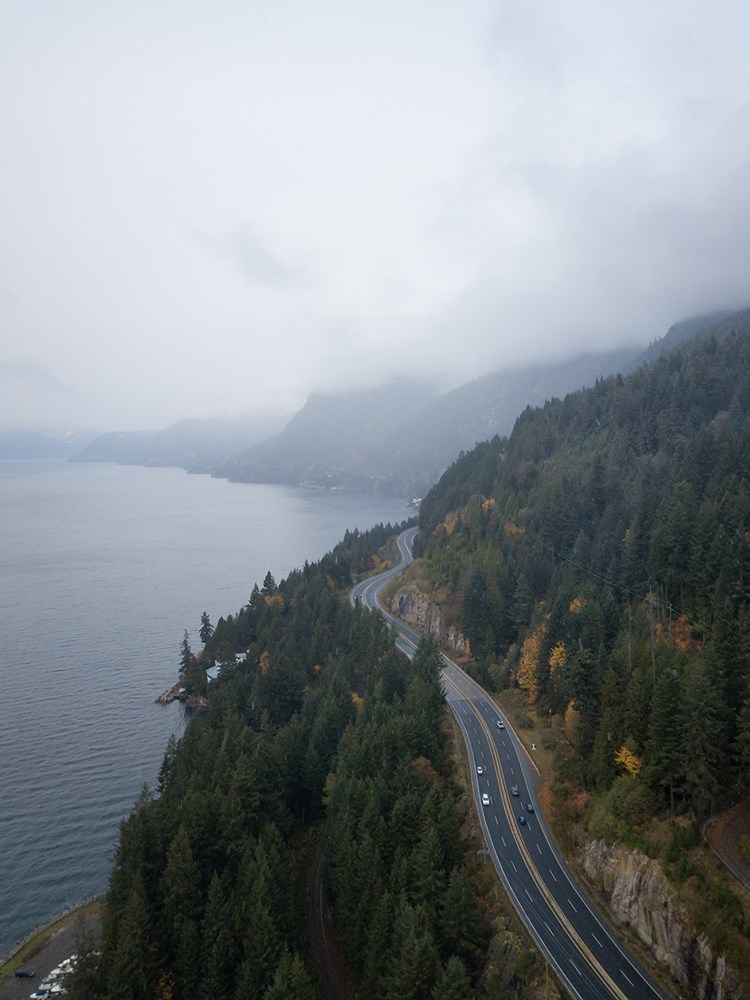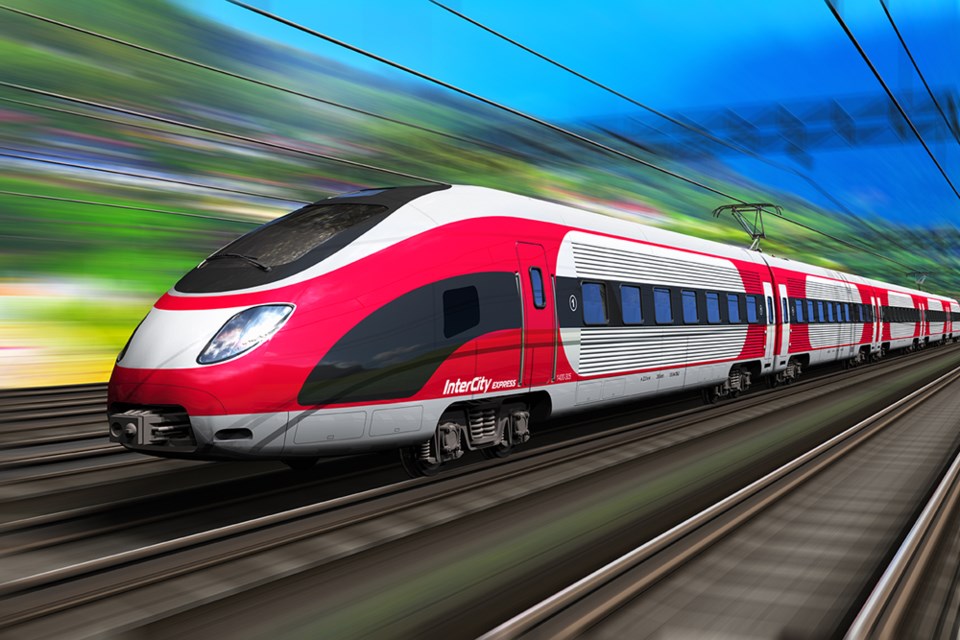Local leaders are reacting to a high-speed rail line proposal that would take passengers from Vancouver to �鶹�����and up to Whistler in just over half an hour.
"We are seeing many new and exciting ideas being proposed to address social and environmental issues in an effort to help the province build back better from the pandemic," Mayor Karen Elliott told The Chief.
"This is certainly an ambitious idea for the future of connectivity that, if successful, would change the face of this corridor in terms of even more rapid growth and density, which some would welcome and others would not. This type of project would take many, many years to come to fruition. While we always have one eye to the future, we will also keep our focus on our current efforts to grow a diverse local economy so that our talented workforce can live, work and play in Squamish."
Called the Mountain Valley Express (MVX), the envisioned high-speed rail corridor would connect Vancouver to Whistler in the north and Chilliwack to the east. With speeds of up to 300 kilometres an hour, proponents say the MVX could carry up to 15,300 passengers per hour and would cut down on travel time by up to 80%, compared to driving by car.
The MVX calls for 11 rail stations, located at Whistler, Squamish, Horseshoe Bay, North Vancouver, Waterfront, Commercial-Broadway, Lougheed, Surrey, Langley, Abbotsford, and Chilliwack.
Proponents predict the creation of 460,000 to 1 million jobs over 30 years.
“We have a choice. Do we continue business as usual, or chart a new path to prosperity, a path that also considers the large looming climate emergency?” said PhD candidate and urban planner Alex Gaio in a release.
A recent masters graduate of Sweden’s KTH Royal Institute of Technology, Gaio is heading the so-called MVX Collective, which is pushing the province to launch a feasibility study on the rail line.
Utilizing predominantly existing highway and rail corridors, MVX is planned to feature new, dedicated rail tracks that are forecast to accommodate 97,000 trips per day, removing an estimated 20% of drivers off of congested highways.
“Climate change requires us to rethink how we live, work, and play,” the report reads. “We can no longer continue investing billions in public funds towards highways, which fuel rising congestion, greenhouse gas emissions, and expensive sprawl that eat away our farmland and forests. We can, and we must, do things differently.”
MVX draws on being considered for the Pacific Northwest that would link Vancouver to Seattle and Portland. That proposed $50-billion bullet train is now being studied by officials in B.C., Washington state, and Oregon.
Reached in Ireland, where Gaio is currently staying, he told The Chief that since the proposal was released and given extensive media coverage he hasn't received a single negative message through its website.
Professionals have written to offer to donate their skills to the project.
"There has been overwhelming support," he said, though he has acknowledged the plan has faced some criticism.
"There's some people who have been saying those classic 'reality check' soundbites, but that is to be expected. We came into this knowing it was extremely visionary and I think that now is the time to talk about."

Green candidate reaction
“This proposal is more of a conceptual plan, but it is an exciting idea that appeals to my professional interests and experience as an engineer," Jeremy Valeriote, BC Green party candidate for MLA told The Chief in an email.
"A robust feasibility study will be needed before the BC Greens can say more, particularly if there are any potential environmental impacts. But we definitely support transit projects in general, especially one that could have a tremendous impact on reducing carbon emission and traffic gridlock. The impact to the corridor in terms of increased development pressures on a limited land base in the valleys would need to be discussed with local communities.”
Asked if the plan was practically feasible, Valeriote said that "rail is definitely a transportation mode that makes sense for regional transit, like moving people — workers, residents, and tourists — from Greater Vancouver to mountain communities like Squamish, Whistler and beyond.
NDP weighs in
NDP candidate Keith Murdoch was also supportive of the plan in principle.
"Certainly, creating more environmentally sustainable ways to travel needs to be a priority for all of us," he told The Chief in an emailed statement.
"The first priority for the West Vancouver-Sea to Sky region is to work on a robust post-pandemic recovery that brings back tourism, business, and good-paying jobs," he said.
"If elected MLA, I look forward to hearing from local residents, municipal councils, and First Nations to find out what their focus is and what we can do together.
A proposal like this does spark the imagination and we definitely need this kind of creativity as we move forward."
��BC Liberal candidate response
Incumbent MLA candidate Jordan Sturdy, of the Liberals, calls it "aspirational," but an interesting idea.
"I think it is probably a little more practical on the Fraser Valley side because there are some corridors there you could make it relatively straight — it needs time to pick up speed," he said, adding that the photo on the cover of the report is a rendering of Watts Point with the train speeding around a corner, is likely not realistic.
"It is quite a corner there."
Sturdy said it would be wise to go back and look at the research done about transportation in the corridor for the 2010 Olympics bid book, done in 2002.
At the time, a higher speed rail was abandoned in favour of widening the highway and buses, but it is time to revisit the research done, he said.
"I think technologies have perhaps changed, there's been significant growth in the region," he said, adding the Liberals provincially and federally, the Liberal governments had been favourable to pulling that original assessment done and modernizing it.
Sturdy also echoed Mayor Elliott's assertion that the corridor would significantly change if �鶹�����became minutes from the downtown core of Vancouver.
"I have a feeling it would alter Squamish's course, in terms of the evolution of the community."
Rail has been put forth as a to since the corridor commuter train was discontinued in the 2000s. The hang-up there has usually hinged on cost, and at an estimated price tag of between $7 billion and $16 billion, MVX will would come at a steep cost to taxpayers — although proponents are recommending that revenues from B.C.’s carbon tax be used to fund a portion of the project, along with any available federal monies and land-value capture revenue from around rail stations. Without MVX, proponents said there would be increased pressure to expand and upgrade both Highway 99 and Highway 1, which, according to their estimates, would cost between 30% to 70% more than building the MVX line.
“With the most significant travel time savings of any transportation projects built in recent history, the economic returns for MVX will be felt for a generation,” the report stated, noting the project would create between $47 billion to $61 billion in “transportation benefits” over 30 years.
With Greyhound no longer servicing B.C., and increased congestion on Highway 99, there’s no denying the immense impact the rail line could have on travel and tourism in the Sea to Sky. Pre-COVID at least, resort stakeholders were already wrestling with so-called , with Whistler attracting close to 3 million visitors a year and �鶹�����locals bemoaning over-used parks and waterways.
“Anchored by Whistler Blackcomb … the Sea to Sky has seen incredible economic growth and tourism demand since the 2010 Olympics,” the report read. “However, this has also brought unprecedented highway congestion, creating unreliable travel times and unanticipated pressures on natural areas. Continued sustainable development is only possible with the alternative, fast transportation connection enabled by MVX.”
To view the full report, visit .
��




